
JOURNAL OF PHYSIOLOGY AND BIOCHEMISTRY
Scope & Guideline
Empowering Scholars to Shape the Future of Health Sciences
Introduction
Aims and Scopes
- Metabolic Disorders and Their Mechanisms:
The journal frequently publishes studies on the mechanisms underlying metabolic disorders such as obesity, diabetes, and fatty liver disease, exploring pathways like inflammation, oxidative stress, and signaling pathways. - Cancer Biology and Therapeutics:
Research articles often investigate the molecular mechanisms of cancer progression, particularly focusing on the role of microRNAs, exosomes, and cellular signaling pathways in cancer biology. - Exercise Physiology and Muscle Biology:
The journal includes a significant number of papers on the physiological effects of exercise, muscle metabolism, and adaptations, as well as the role of skeletal muscle in overall health and disease. - Nutritional Biochemistry:
Nutritional studies are prominent, with articles examining the biochemical impacts of various dietary components and supplements on metabolic health, disease prevention, and treatment. - Cardiovascular Physiology and Pathology:
The journal covers cardiovascular health extensively, discussing topics like atherosclerosis, cardiac function, and the effects of different interventions on heart health. - Neurophysiology and Neuroinflammation:
Research on the effects of metabolic disorders on neurophysiology, including studies on neuroinflammation and the implications for conditions like diabetes and obesity, is also prevalent.
Trending and Emerging
- MicroRNA and Exosome Research:
There is a notable increase in studies focusing on the roles of microRNAs and exosomes in various diseases, particularly cancer and metabolic disorders, highlighting their significance in intercellular communication and potential therapeutic targets. - Inflammation and Metabolic Dysfunction:
Research exploring the links between inflammation and metabolic dysfunction is trending, with increasing emphasis on understanding how inflammatory processes contribute to diseases such as obesity and diabetes. - Exercise and Metabolic Health:
The role of exercise in regulating metabolic health is gaining traction, with numerous studies investigating how different types of exercise influence muscle metabolism, fat loss, and overall health outcomes. - Nutritional Interventions and Disease Prevention:
There is a growing emphasis on the impact of dietary components on health, with research exploring how specific nutrients can modulate disease processes and contribute to metabolic health. - Circadian Rhythms and Metabolism:
Emerging research on circadian rhythms and their influence on metabolic processes is becoming more prominent, reflecting a growing interest in how biological clocks affect health and disease.
Declining or Waning
- Traditional Pharmacological Approaches:
There appears to be a waning interest in studies focusing solely on conventional pharmacological interventions for metabolic diseases, as newer approaches such as dietary and lifestyle interventions gain prominence. - Basic Mechanistic Studies without Clinical Relevance:
Research that emphasizes basic mechanistic studies without a clear connection to clinical applications or implications is becoming less frequent, with a shift towards translational research. - Animal Models of Disease without Human Correlation:
There is a noticeable decrease in studies using animal models that do not draw parallels to human health or disease, as the journal increasingly favors research with direct implications for human physiology.
Similar Journals
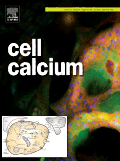
CELL CALCIUM
Unlocking the Secrets of Calcium SignalingCELL CALCIUM is a premier journal published by ELSEVIER SCI LTD, focusing on the critical role of calcium in cellular processes, making it an essential read for researchers and professionals in the fields of Cell Biology, Molecular Biology, and Physiology. Having been in publication since 1980, this journal is well-regarded, holding a Q2 ranking in Cell Biology and Molecular Biology, as well as a prestigious Q1 status in Physiology for 2023. With an impressive Scopus ranking that places it in the top 20% of journals in its categories, CELL CALCIUM aims to disseminate original research articles that advance the understanding of calcium signaling mechanisms and their implications in health and disease. Although not available via open access, its insights are critical for advancing knowledge and fostering collaboration within the scientific community. The journal is located in the United Kingdom, with its editorial excellence helping to promote high-impact research that continues to influence both academia and industry.
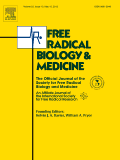
FREE RADICAL BIOLOGY AND MEDICINE
Pioneering Research on Oxidative Stress and Therapeutic InnovationsFREE RADICAL BIOLOGY AND MEDICINE, published by Elsevier Science Inc, is a premier journal dedicated to the field of biochemistry and medical physiology. With an ISSN of 0891-5849 and an E-ISSN of 1873-4596, this journal stands out with its impressive ranking in the 2023 category quartiles: Q1 in Biochemistry and Q1 in Physiology (medical). Specifically, it has achieved a remarkable position of 29th out of 438 in Biochemistry and 8th out of 113 in Physiology, placing it firmly in the 93rd percentile of its field, as per Scopus rankings. Since its inception in 1987, the journal has focused on advancing the understanding of free radicals and their role in biological processes, encompassing a wide range of topics from oxidative stress to therapeutic applications. Although it does not currently offer open access, the journal's rigorous peer-review process and impactful research ensure that it remains a valuable resource for researchers and professionals seeking to explore the intricate relationships between free radicals and health. The journal's headquarters are located at STE 800, 230 Park Ave, New York, NY 10169, reflecting its esteemed place within the scientific community and commitment to high-quality research.
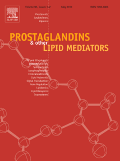
PROSTAGLANDINS & OTHER LIPID MEDIATORS
Exploring the Dynamics of Prostaglandins and BeyondPROSTAGLANDINS & OTHER LIPID MEDIATORS, published by Elsevier Science Inc, is a leading journal dedicated to the advancements in the field of lipid mediators, with a specific focus on prostaglandins and other bioactive lipids. This journal, indexed under ISSN 1098-8823 and E-ISSN 2212-196X, serves as a crucial platform for researchers and professionals to disseminate significant findings that span multiple disciplines, including Biochemistry, Cell Biology, Pharmacology, and Physiology. In the 2023 category quartiles, it has achieved commendable positions such as Q2 in Biochemistry and Q2 in Physiology, underscoring its importance and influence in these domains. Although it is not an open-access journal, it provides robust access options, enhancing the visibility of vital research. With its establishment in 1996, the journal continues its commitment to fostering innovative research until 2024, making it an essential resource for those involved in the dynamic realms of lipid biology and medical research.

Physiology International
Unlocking Insights for a Healthier TomorrowPhysiology International is a distinguished journal dedicated to the exploration and advancement of knowledge in the fields of physiology, sports medicine, and rehabilitation. Published by AKADEMIAI KIADO ZRT in Hungary, this open-access journal has been a reliable source of scholarly articles since its inception in 2016, providing valuable insights into both complementary and alternative medicine, as well as traditional medical practices. With an impact factor that situates it in Q2 and Q3 quartiles across related disciplines, including Physical Therapy, Sports Therapy and Rehabilitation and Orthopedics and Sports Medicine, it represents a vital resource for professionals and researchers looking to stay abreast of the latest findings and methodologies. The journal is indexed on Scopus, signifying its credibility and relevance in the medical community. As it continues to develop through 2024, Physiology International invites contributions that challenge existing paradigms and foster innovative approaches to health and wellness, making it an essential platform for advancing the conversation in medical physiology and its applications.

Physiological Reviews
Connecting Scholars with Cutting-Edge Physiological InsightsPhysiological Reviews is a prestigious journal published by the American Physiological Society, dedicated to advancing our understanding of physiology across various domains. With an impressive impact factor that places it in Q1 quartiles for medicine, molecular biology, and physiology as of 2023, this journal is recognized as a leading source of high-quality reviews and research analyses. The journal has been a vital resource for the scientific community since its inception in 1945, providing in-depth and comprehensive insights that are crucial for both scholars and practitioners in the field. Although not an open-access publication, it remains widely accessible through institutional subscriptions, ensuring that crucial research findings are disseminated efficiently. With Scopus rankings that place it in the top percentile across multiple categories, Physiological Reviews continues to be an essential platform for the latest advancements and discoveries in physiology, making it indispensable for researchers, professionals, and students alike.

Cell Stress
Connecting Researchers to Transform Molecular MedicineCell Stress is a prestigious, peer-reviewed open access journal dedicated to advancing research in the fields of biochemistry, genetics, molecular biology, cancer research, and physiology. Published by SHARED SCIENCE PUBLISHERS OG in Austria, this journal has rapidly established itself since its inception in 2017, achieving Q1 status in multiple categories, indicative of its high impact and quality. With an impressive Scopus ranking—holding a top percentile position in its respective fields—Cell Stress aims to foster interdisciplinary collaboration and disseminate cutting-edge findings that enhance our understanding of cellular stress mechanisms and their implications in health and disease. The journal's commitment to open access since its launch ensures that critical research is accessible to a global audience, thereby facilitating the exchange of knowledge among researchers, professionals, and students alike. Address your submissions or inquiries to AM BLUMENHAG 25-4, Graz 8010, Austria, and contribute to this dynamic platform that is shaping the future of molecular medicine.

CELLULAR SIGNALLING
Pioneering Research in Cellular SignallingCELLULAR SIGNALLING, published by Elsevier Science Inc, is a premier journal within the realm of Cell Biology, boasting an impressive Q2 category ranking as of 2023. With an ISSN of 0898-6568 and an E-ISSN of 1873-3913, the journal has established itself as a critical platform for advancing the understanding of cellular mechanisms and signal transduction pathways since its inception in 1989. Covering a vast array of topics in Biochemistry, Genetics, and Molecular Biology, it ranks notably at 87 out of 285 in the Scopus list, placing it in the 69th percentile among its peers. The journal serves as an invaluable resource for researchers, professionals, and students seeking high-quality, impactful studies that drive forward the field of cellular biology. While it operates under traditional subscription access, its highlights include rigorous peer-reviewed articles, reviews, and insights that continue to shape current scientific discourse.
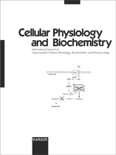
CELLULAR PHYSIOLOGY AND BIOCHEMISTRY
Connecting Researchers through Open Access ScholarshipCellular Physiology and Biochemistry is a premier Open Access journal published by the prestigious Cell Physiol Biochem Press GmbH & Co, dedicated to advancing research in the fields of physiology, biochemistry, and molecular biology. Since its inception in 1987 and transitioning to an Open Access model in 2013, the journal has established itself as a vital resource for the dissemination of high-quality research and reviews, showcasing innovative methodologies and groundbreaking findings in cellular processes. With an impressive ranking in the 2023 Scopus category as Q2 in Physiology and a robust percentile of 61, Cellular Physiology and Biochemistry is committed to fostering academic dialogue among researchers, professionals, and students alike. This journal not only provides unrestricted access to its articles, but also promotes the global sharing of knowledge, which is essential for the advancement of our understanding in these vital scientific areas. The journal's editorial team is dedicated to ensuring the highest standards of academic rigor and relevance, making it an indispensable addition to the libraries of those engaged in the life sciences.
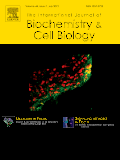
INTERNATIONAL JOURNAL OF BIOCHEMISTRY & CELL BIOLOGY
Bridging Research and Innovation in Life SciencesThe International Journal of Biochemistry & Cell Biology, published by Pergamon-Elsevier Science Ltd, stands as a pivotal resource in the fields of biochemistry and cell biology. With an ISSN of 1357-2725 and an E-ISSN of 1878-5875, this prestigious journal has been a key platform for disseminating cutting-edge research since its inception in 1995. The journal currently holds an impressive Q1 ranking in Biochemistry and a Q2 ranking in Cell Biology for the year 2023, reflecting its commitment to high-quality research and its influence within the scientific community. With a significant Scopus ranking of 94/438 in Biochemistry and 96/285 in Cell Biology, the journal plays a crucial role in advancing knowledge and fostering innovative approaches in these dynamic fields. Though it is not an open-access journal, the International Journal of Biochemistry & Cell Biology remains accessible to a wide audience, making it a vital resource for researchers, professionals, and students alike, who are eager to explore and contribute to the ongoing advancements in biochemistry and cell biology.

ARCHIVES OF PHYSIOLOGY AND BIOCHEMISTRY
Empowering Researchers with Cutting-Edge DiscoveriesArchives of Physiology and Biochemistry, published by Taylor & Francis Ltd, is a renowned journal that has been pivotal in advancing knowledge and research in the fields of physiology and biochemistry since its inception. With an impact factor reflective of its significant contributions, this journal is categorized in Q2 in Medicine (miscellaneous) and Q3 in Physiology, underscoring its relevance and scholarly impact within the scientific community. The journal publishes original research articles, review papers, and innovative methodologies that explore the intricate relationships between physiological functions and biochemical processes. With its commitment to fostering scientific discourse, the Archives of Physiology and Biochemistry serves as an essential resource for researchers, professionals, and students alike, providing insights and evidence that drive forward the frontiers of medical and physiological science. The journal is accessible in both print and online formats, ensuring that critical research reaches a wide audience.